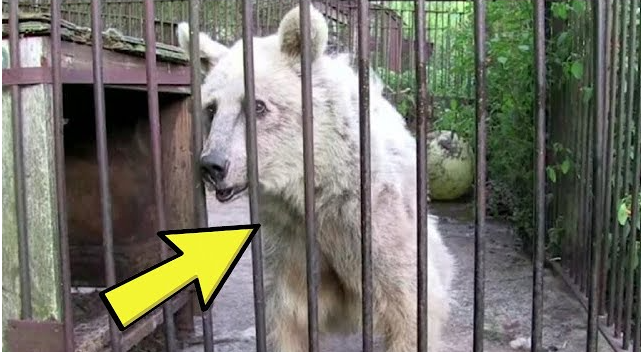
“Going to the zoo with your family offers a unique chance to experience rare and beautiful animals up close. Still, for enjoyable as these establishments may be, not all of them are run the way they should be.
One Pennsylvania zoo was a terrible example of that. This roadside zoo was supposed to be a source of fun and entertainment for people all over the region, but the truth was much, much darker. In reality, it was more like an animal prison.
It was especially rough for four bears named Marsha, Fifi, Bruno, and Pocahontas. They were forced to spend their entire lives in a Pennsylvania roadside zoo, and now their story is finally being told.

As a major attraction of the dingy roadside zoo, the four bears were most prominently displayed in these rusty cages. Besides the uncomfortable living space itself, there was no shade, shelter, or water for swimming or cooling off. A closer look at their living spaces showed they only had a rickety doghouse to protect them at night.
Not to mention, they were all kept from hibernating according to their natural cycle so they could continue to entertain zoo guests. When the bears weren’t in their respective cages, they were being forced to participate in cruel circus acts. The trainers would place a mask around their faces and a rope around their necks, and then they would bring them out and force them to perform a routine.
By the time the bears were eventually discovered by animal rights organization PETA, they had developed serious health problems. They’d spent their days pacing in their cages and shaking, which were signs of severe distress.
Thankfully, the volunteers from PETA had handled many similar cases in the past and knew exactly what to do. After rounding up all of the bears, they quickly transported them to the Wild Animal Sanctuary in Colorado. It was a 24-hour cross-country journey, but the bears finally arrived at the animal sanctuary.
They were finally let out of their cages and allowed to roam free for the first time in their lives. It was a moment that few could ever forget. It’s so sad that many people still think that it’s okay to keep animals in such poor living conditions. Thankfully for these bears, they were finally getting the first taste of freedom.
As it turns out, there were many people fighting against captivity for animals like these bears. A 2011 incident in Zanesville, Ohio, for example, led to the enactment of the Dangerous Wild Animal Act, which increased regulations on types of wild animals people in Ohio were allowed to own. It wasn’t meant to punish the animals but to protect them.
Recently, this law forced Stump Hill Farm, an establishment that brands itself as a rescue, to surrender nine bears to the authorities. The farm was accused of breeding exotic animals, which was not in line with the missions of a rescue organization. These bears, which were a mix of black and grizzly, were in poor health. Some were malnourished, while others were extremely overweight. But the one thing they all had in common was that they were forced to live in cages for their entire lives.
Once they were rescued, they were held in a temporary state-run facility before they were placed in permanent care. It wasn’t long, however, before the staff learned that two of the bears, Molly and Ursula, were both pregnant. Soon, there were 13 bears instead of nine. The bears would need to be moved if they wanted to grow up in good health, so PETA stepped in and brought the bears, all 13 of them, to the same Wild Animal Sanctuary in Colorado where the bears from Pennsylvania had gone.
It took a while for the bears to warm up to their new living space, but the staff was more than ready to manage their anxiety. At first, they were given an optional cage, a safe space in case their nerves got the best of them. With the proper care, however, the bears finally began to explore their new surroundings, covering the sanctuary’s expansive grounds.
It was like nothing they had ever experienced in their lives before. It should come as no surprise that they adjusted so quickly, especially since bears are incredibly adaptive animals. The staff was in no rush to get them acquainted with the outdoors, but they were determined to give them all the time they needed. Luckily, Molly and Ursula, the two new mother bears, didn’t have to turn over their cubs, which was what would have happened if they still lived in captivity. In Colorado, they were allowed to stay together as a family.”




